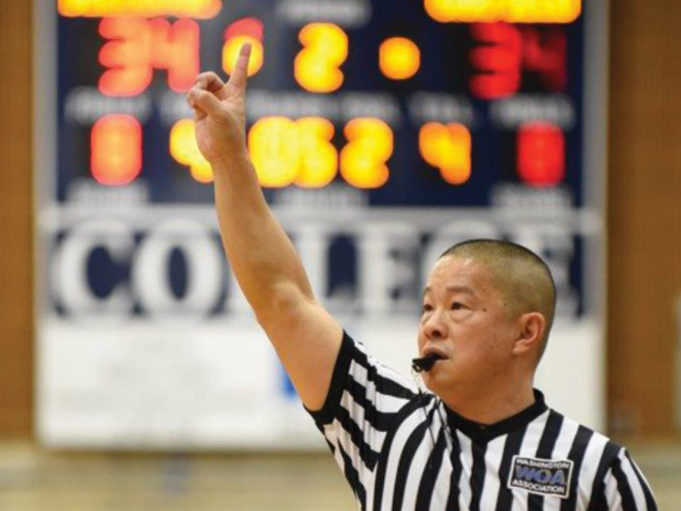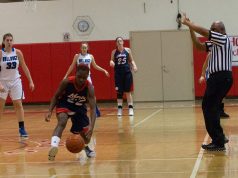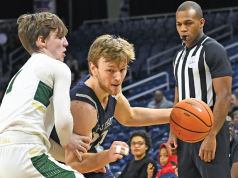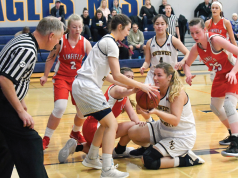There are three seconds to play in the game. The score is tied and team A must go the length of the court to get off a good shot. The ball is inbounded from the endline. Team B is in a fullcourt press. A1 catches the ball and avoids a trap on the near sideline. She takes two dribbles and passes ahead to A2, who is standing at mid-court. A2 takes two dribbles and passes to A3. A3 catches the ball on the right wing and drives to the hoop and scores.
The crowd goes crazy and so do you! Why? The horn to end the game has yet to sound. So what do you do now? You must be aware of the clock at all times. You must see the clock start when the ball is legally touched on the floor. No excuses! You just officiated a great game. No one will remember the previous 1,917 seconds in your high school game or the previous 2,397 seconds in your college game if there is an issue at the end of the game. Timing errors are always credited to the officials, not the timer.
The question becomes, how do you avoid those mishaps in your game? Unfortunately, there will always be mistakes when dealing with varying table crews.
You may have the teenage scorekeeper who cannot stop texting long enough to write down the score, or the scorekeeper who records the foul before you even report it. How about the clock operator who is too busy coaching to start the clock? There is always the mom or dad the coach pulled out of the stands because no one else was available. First-time timers may start the clock as soon as you hand the ball to the inbounder.
Regardless of the experience level of your table crew, you are responsible for their mistakes. Your goal is to minimize the impact that a table error can have on your game. Table management and clock awareness go hand in hand. You can’t have one without the other. The three keys to good table management and clock awareness are: preparation, information and communication.
Preparation
Preparation begins with three assumptions:
1. Assume that your table crew will be inexperienced.
2. Assume that your table crew will make mistakes.
3. Assume that your fellow officials will not catch them.
By assuming the worst, you can expect the best from yourself.
The best officials are prepared by knowing the rules. Get out your rulebook and study the following for NFHS and NCAA games: correctable errors, foul administration, scoring and timing regulations, live-ball/dead-ball, alternating possession, timeouts and technical fouls. In addition, college (and some high school) officials need to know the rules governing the use of a court-side monitor and the shot clock.
Upon arriving at the game site, locate the game clocks and the shot clocks if appropriate. If you have a college game with the use of a court-side monitor, inspect that as well. Allow sufficient time to meet with the scorer and timer. You should report to the table at least two minutes prior to the 10-minute mark to avoid having to start the game with a technical foul. Prepare an information sheet for the table crew that it can refer to and keep.
Information
The information you provide to the table will need to be tailored to the level of basketball you are officiating. However, universally you must remind the table you are the same team as they are. The officiating crew and the table crew must work together to ensure the fairness and integrity of the game. It doesn’t matter what school they are affiliated with. On that day they are a member of the officiating team. Politely introduce yourself. Be sure to ask the scorer and timer if they have any questions for you. When working with a veteran table crew you must be tactful in your approach. Always ask them how they handle certain situations.
Communication
You’ve heard it before but communication is imperative in establishing good table management and clock-awareness skills. You must have good communication with your fellow officials, table and coaches in order to avoid correctable errors as well as uncorrectable errors.
Communication starts with a thorough pregame conference. The following topics should be covered: clock awareness, last-shot responsibility, eye contact, free-throw confirmation, fouls/bonus, disqualifications, timeouts, warnings on teams and coaches, technical fouls, throw-ins, team control, substitutes and correctable errors. For example, over-emphasize the importance of making eye contact with your partners and counting players before administering the ball to an inbounder. It is possible that your table allowed a sub to enter the game without reporting.
Don’t rely on the table for accuracy with the alternating-possession arrow. There are several ways to remember. Some officials keep a coin or a whistle in their pocket and switch it after every held ball. Others repeat the color of the team in order to remember. It doesn’t matter how you do it, just do it.
Be cognizant of your surroundings. A couple of seconds accidentally ticking off the clock may not seem like a big deal in the second quarter but those same seconds could mean the difference between a win and a loss for a team in the end. It’s the little things, such as clock awareness, that will carry you to the next level.
What's Your Call? Leave a Comment:
Note: This article is archival in nature. Rules, interpretations, mechanics, philosophies and other information may or may not be correct for the current year.
This article is the copyright of ©Referee Enterprises, Inc., and may not be republished in whole or in part online, in print or in any capacity without expressed written permission from Referee. The article is made available for educational use by individuals.


















